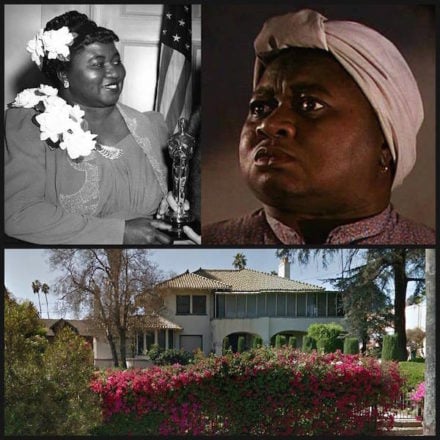
This year marks the 78th anniversary of Hattie McDaniel winning the Oscar (upper left) for Best Supporting Actress as Mammy in “Gone With the Wind” (upper right). She was the first black performer to win the award. McDaniel also fought racist covenant in her West Adams Heights neighborhood. Her house is pictured above. Photo: Preserving Historic LGBT Sites in California.
Here’s some Black History Month trivia for the 2018 Oscars.
IDENTIFIED AS BISEXUAL
This year marks the 78th anniversary of the first Oscar awarded, in 1940, to a black performer – Hattie McDaniel for best supporting actress as Mammy in “Gone With The Wind” – and possibly the first bisexual woman.
McDaniel, who identified as bisexual and counted Broadway and film star Tallulah Bankhead among her lovers, was treated with gross disrespect in Los Angeles when segregation and racism flourished.
ALSO READ: Sister Rosette Tharpe, godmother of rock ‘n’ roll, and a lesbian
FOUGHT RACIST COVENANT
For example, white residents filed a lawsuit against McDaniel and other African Americans who moved into the Sugar Hill section of the West Adams Heights neighborhood of Los Angeles, where deeds included a racist covenant forbidding sale to ‘non-Caucasians.’
McDaniel organized her black neighbors, and they fought back.
WENT TO COURT
The case went to court in December 1945, and 250 supporters accompanied McDaniel to the hall of justice in downtown Los Angeles.
Counsel for the racist neighbors argued that restrictive housing covenants were constitutional. In 1917, the Supreme Court ruled in Buchanan v. Warley that it was unconstitutional for local governments to allow racial housing segregation, but nine years later, the court ruled in Corrigan v. Buckley that racial segregation through private deeds was legal.
ALSO READ: Oscars 2018 — ‘Mudbound’ makes history for African Americans
CASE DISMISSED
After hearing both sides, Los Angeles Superior Judge Thurmond Clarke went to Sugar Hill to see for himself.
The very next day, Clarke threw out the case.
“It is time that members of the Negro race are accorded, without reservations or evasions, the full rights guaranteed them under the 14th Amendment to the Federal Constitution,” Clarke said. “Judges have been avoiding the real issue too long.”
The 14th Amendment guarantees equal protection under the law.
McDaniel owned her longtime residence at 2203 S. Harvard Blvd. until her death from breast cancer in 1952.
MOST SIGNIFICANT HOUSE
“The house still stands and most of the grounds are preserved. The site is one of the most significant in California for the intersectional histories of Hollywood, bisexuality, African Americans, women and civil rights organizing,” Preserving Historic LGBT Sites in California said.
